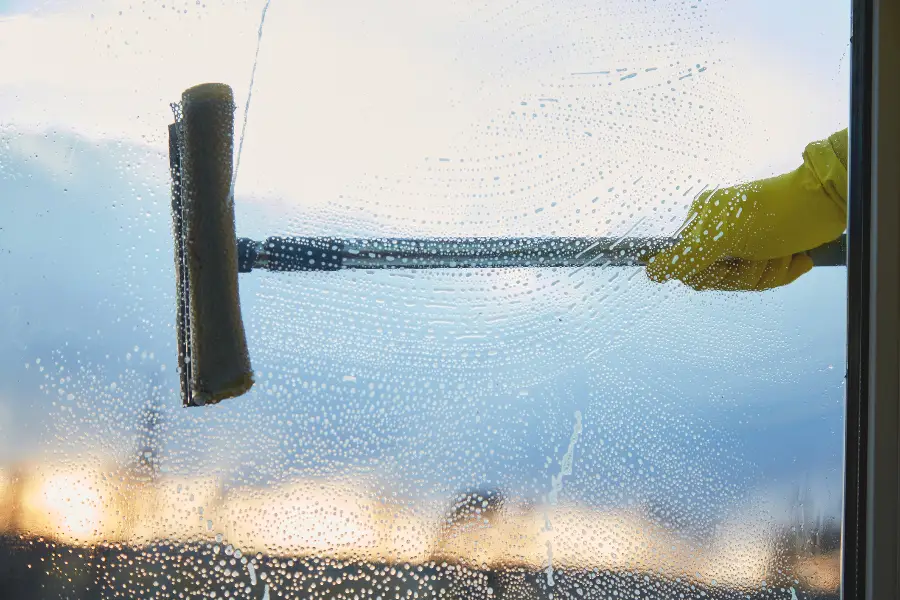A level of hygiene is required across a range of professional sectors, as it’s key to protecting the safety and health of both employees and service users.
In the UK, the most important health regulation for employers to abide by is the Health and Safety at Work Act (1974). We’ll go into more detail on this Act and how it affects different industries shortly, but the overarching theme is that employers are responsible for the health and safety of people who work on, and visit, their premises.
In this post, we’ll focus in particular on how the regulations relate to cleanliness, and how they can be applied to offices, retail stores and leisure spaces.
What is the Health and Safety at Work Act (1974)?
The Health and Safety at Work Act (1974) has been setting the standard for workplace conditions for several decades. It’s aimed at employers and focuses on the health and safety of both workers and members of the public.
Employers have a legal obligation to ensure the well-being of their employees and service users while they are on the premises; this includes ensuring cleanliness in the workplace.
Some of the most relevant sections of the Health and Safety at Work Act include:
Section 2 – General duties of employers to employees
This section requires employers to ensure the health, safety, and welfare at work of all employees.
Section 3 – General duties of employers (and self-employed persons) to those other than their employees
This section requires employers to ensure that persons other than their employees are not exposed to risks to their health and safety.
Section 4 – General duties of persons concerned with premises to persons other than their employees
This section requires persons who have control of non-domestic premises to ensure that the premises are safe and without risks to health.
Section 7 – General duties of employees at work
This section requires employees to take reasonable care for their own health and safety, and that of others who may be affected by their work.
The above sections link to workplace cleanliness because they require employers to ensure the health and safety of their employees, and to ensure that the workplace is free from hazards that could cause harm to employees or other persons.
This includes ensuring that the workplace is clean and hygienic, and that people are not exposed to risks from dirt, dust, or other contaminants.
Applying Cleanliness Regulations to Different Sectors
When it comes to relating the Health and Safety at Work Act to different sectors, employers need to make their own judgements to ensure that they are maintaining appropriate standards.
Here are some things to consider when it comes to linking these regulations and cleanliness for different sectors:
Cleanliness Regulations for Offices
Offices need to provide a clean and safe working environment for employees and visitors. This helps with worker satisfaction which improves productivity. Some of the ways to achieve this include:
- Ensuring there are no trip hazards
- Fixing broken fixtures and machinery to prevent injury
- Frequently cleaning surfaces and equipment (such as keyboards) to prevent germ transfer
- Regularly cleaning office kitchen areas
- Cleaning carpets to prevent an excess of trapped dust that can trigger allergies
Check out our complete guide to deep cleaning your office for more tips.
Cleanliness Regulations for Leisure Spaces
Leisure spaces such as restaurants, cafes, cinemas, and theatres see a high amount of footfall and have a lot of touch points, making it crucial to keep on top of a thorough cleaning schedule. A clean environment is the best way to keep customers coming back. Some of the ways to ensure that leisure spaces comply with the Health and Safety at Work Act include:
- Adhering to crucial food and kitchen hygiene standards
- Keeping toilets and public facilities clean and regularly checked
- Regularly cleaning upholstery and other soft furnishings
- Frequent cleaning of common touch points
- Cleaning behind fridges and appliances
- Ensuring the regular replacement of filters in ventilation systems
Cleanliness Regulations for Retail Stores
Retail stores often have a high amount of footfall, making it crucial for cleanliness safety standards to be maintained. Aside from the health benefits, a clean environment instils trust in customers, making them more likely to make a purchase. Some of the ways to help with cleanliness in a retail environment include:
- Regularly cleaning facilities, such as toilets, to a strict schedule
- Dusting and cleaning display cases, cabinets and shelves
- Keeping floors clean, dry and free from dust
- Ensuring lighting fixtures are free from dust and dirt
How to Maintain Cleanliness Regulations as an Employer
Although employees and service users can do their bit to keep their environment clean – such as not creating extra clutter and wiping down equipment after use – you can’t rely on this to maintain appropriate standards for the Health and Safety Act (1974).
In professional environments, the best thing to do is contract a commercial cleaning service like Dorset Commercial Cleaning.
Using a reputable, trained team of cleaners will ensure that all aspects of your business are maintained to a high standard, helping you comply with necessary health and safety standards without impacting the experience of your employees or customers.
Contract Dorset Commercial Cleaning
Based in Dorset, we’re a professional cleaning company with an exceptional team of cleaners who are trained in delivering high standards to commercial environments.
We use our expertise and experience to ensure that all businesses are meeting their high cleaning standards, no matter the sector.
To find out how Dorset Commercial Cleaning can benefit your company, fill out our contact form or call us on 01202 986700.




